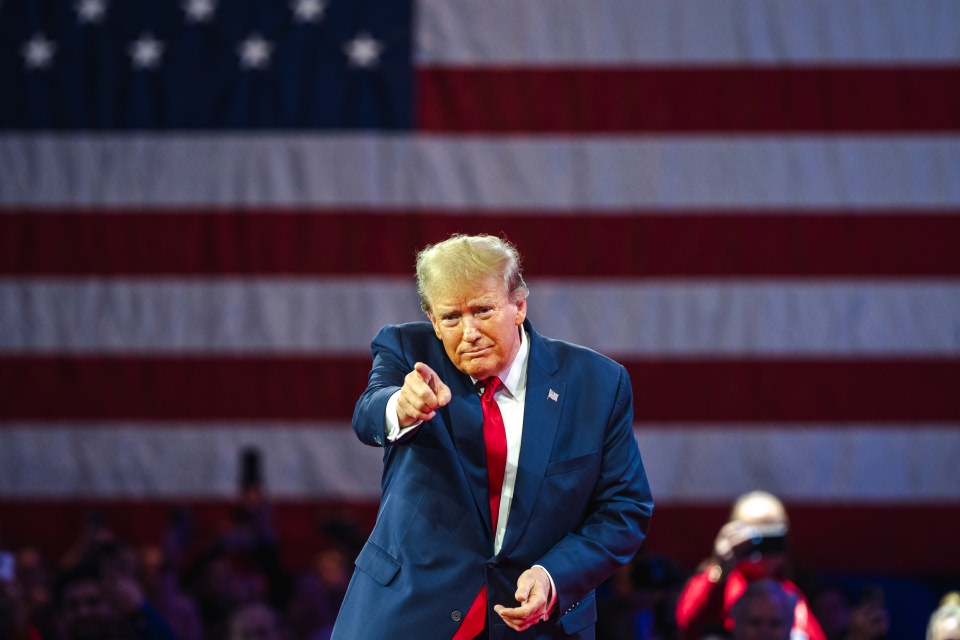After Trump's victory, the USD strengthened, and the overall markets appreciated. Trump's trade policies, including tariffs, may heighten tensions with China, affecting global trade dynamics and potentially causing disruptions in sectors like tech and manufacturing.
While the market reacted positively, uncertainties around policies suggest both opportunities and risks in the coming months. Lets deep dive into them.
Rally in the US stocks
Donald Trump's victory in the 2024 US presidential election resulted in a significant rally in US stocks, driven by investor optimism surrounding his economic policies. The S&P 500 surged 2.51%, hitting a new record high, clearly indicating the market's positive outlook.
Key sectors such as small-cap stocks and banks experienced even more substantial gains, fueled by expectations of a lighter regulatory touch and tax cuts under Trump's administration. The Russell 2000 index, which tracks small-cap companies, rose nearly 6%, and the S&P 500 banks index saw a remarkable jump of 10.68%, highlighting investors' confidence in financial institutions benefiting from deregulation.
Tesla, led by Elon Musk, surged by 14.75%, driven by anticipation of fewer regulations affecting the electric vehicle and tech industries. Additionally, Trump's pledges to introduce tariffs, cut taxes, and reduce regulations encouraged investors to take positions in stocks and sectors expected to benefit from these policies.
On the other hand, stocks in industries that could suffer under stricter trade barriers, such as global manufacturing, were hit harder, reflecting the market's mixed reaction to potential risks from Trump's trade agenda.
USD appreciation
Trump's win also significantly impacted the USD, which appreciated sharply against other currencies. The Dollar surged to its highest level over four months as investors anticipated economic policies that could drive growth and inflation, leading to higher interest rates.
The market expected that Trump's proposed tax cuts and increased spending, combined with tariffs on imports, would stimulate economic growth but also fuel inflation.
This outlook led to increased demand for the Dollar, which investors viewed as a less risky asset, particularly in the face of potential inflationary pressures and higher government debt.
The strengthening of the Dollar was evident in the sharp decline of other currencies. The Mexican Peso, for instance, slumped to its lowest point in over two years as the prospect of higher tariffs on Mexican imports raised concerns about the impact on trade. Similarly, the Euro was on track for its largest daily drop since 2020, reflecting the overall strength of the US currency.
In addition, the rally in the US Dollar was supported by expectations of future interest rate hikes, as Trump's spending and tariff policies were seen as likely to push inflation higher.
David Kelly, chief global strategist at JPMorgan Asset Management, emphasized that the combination of higher inflation and larger fiscal deficits would push long-term interest rates higher, thereby boosting the attractiveness of the USD. This was reflected in the rise of the 10-year US treasury yield to 4.48%, its highest level in over four months, signaling increased confidence in the US economy and the Dollar's strength.
Rising yields challenged stock market stability
US stock market stability was challenged as rising yields dampened investor enthusiasm after Trump’s win. The S&P 500 dropped 2% mid-November, erasing part of the post-election gains spurred by optimism over President-elect Trump's pro-growth policies.
Despite being up 23% this year, stocks are facing headwinds from concerns about inflation and the impact of Trump's policies on the economy. The US 10-year yield surge, driven by fears of inflationary policies, has added pressure. Higher yields make equities less attractive and raise borrowing costs.
Concerns over US-China trade war
Trump's protectionist policies, particularly regarding trade tariffs, will likely reignite tensions in the US-China trade war. Experts predict that China's exports will suffer from rising tariffs, which may help emerging economies like India, especially through the 'China-plus-one' strategy.
This could drive supply chain shifts, offering opportunities for sectors like pharmaceuticals. However, the global market may experience short-term volatility as investors assess the impact on trade, inflation, and interest rates. Since the USD is anticipated to strengthen, emerging markets may face challenges from isolationist policies.
Key sectors such as tech and manufacturing could be disrupted, with strained relationships between the US, China, and the EU. As global supply chains adjust, the full impact of Trump's economic agenda will unfold in the coming months, leading to potential shifts in forex and broader market dynamics.
Trump's tax cuts may boost growth, but higher inflation could offset gains
Donald Trump's policies of higher tariffs, lower taxes, and tighter immigration controls are expected to drive inflation, with economists split on their potential impact on the US economy.
While his tax cuts could boost growth, they may be offset by rising inflation and tariffs, which could reduce consumer purchasing power by $78 billion. Tariffs, particularly on Chinese goods, are forecasted to increase inflation by 3.1% in 2025, up from earlier estimates of 2.3%. The National Retail Federation estimates tariffs will cost households an average of $2,600 annually.
However, tax cuts are expected to support growth, particularly through lower individual rates and continued business incentives. On immigration, a reduction in net migration could limit labor force growth, further fueling inflation. Ultimately, slower GDP growth is anticipated, with economists predicting a modest 3-6% reduction in growth by 2028 due to higher tariffs and stricter immigration policies.
Overall optimism in US financial markets
Donald Trump's victory on November 6 has sparked optimism in US financial markets. The anticipated policies, including tax cuts and deregulation, have boosted US equities, with the S&P 500 up 1% and the Russell 2000, which includes small and mid-caps, rising over 2%.
The promise of corporate tax cuts is expected to benefit small-cap stocks. Meanwhile, higher tariffs and an expanding budget deficit have increased treasury yields and a stronger Dollar. Global markets also reacted positively, with European stocks rising and the Tokyo Stock Exchange gaining 2.5%, benefiting from a weaker Yen.
Trump's victory sparking market optimism in 2024
Trump's 2024 victory sparked optimism in US markets, driving stock gains, especially in small caps and banks, fueled by expected tax cuts and deregulation. However, rising yields and inflation concerns tempered enthusiasm. The USD strengthened, and trade tensions with China may disrupt global markets.
Trade smarter with low spreads and lightning-fast executions. Open a live account today and experience unparalleled support from our dedicated customer service team. Blueberry is here to help every step of the way!
Trade Now Open a Demo Account
